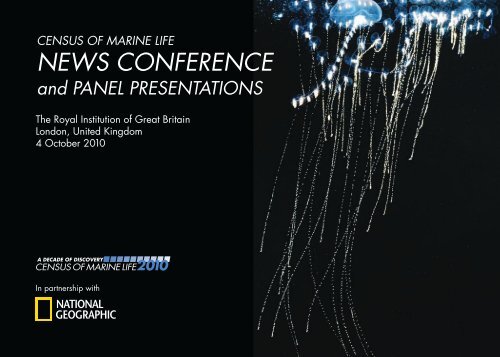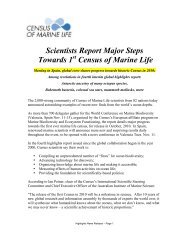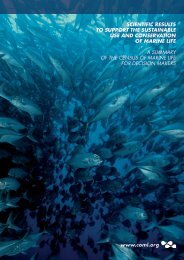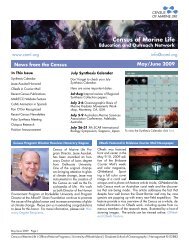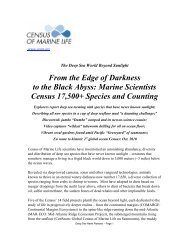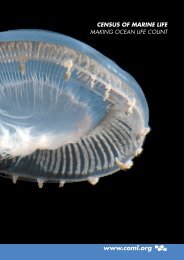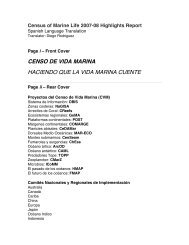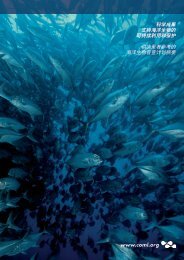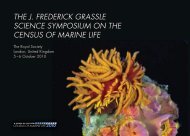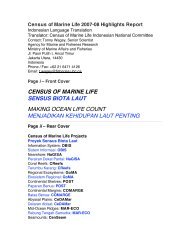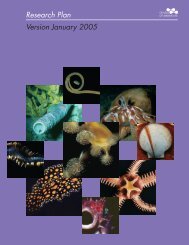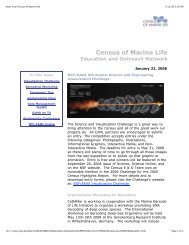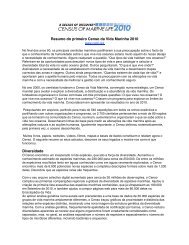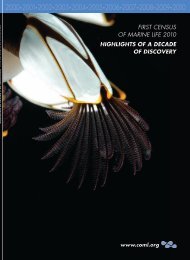News Conference and Panel Presentations - Census of Marine Life
News Conference and Panel Presentations - Census of Marine Life
News Conference and Panel Presentations - Census of Marine Life
You also want an ePaper? Increase the reach of your titles
YUMPU automatically turns print PDFs into web optimized ePapers that Google loves.
CENSUS OF MARINE LIFE<br />
NEWS CONFERENCE<br />
<strong>and</strong> PANEL PRESENTATIONS<br />
The Royal Institution <strong>of</strong> Great Britain<br />
London, United Kingdom<br />
4 October 2010<br />
A DECADE OF DISCOVERY<br />
CENSUS OF MARINE LIFE2010<br />
In partnership with
Inside Cover photo:<br />
School <strong>of</strong> bigeye trevally, Caranx sexfasciatus,<br />
by Roberto Rinaldi,<br />
2<br />
Galatée Films.
CENSUS OF MARINE LIFE<br />
NEWS CONFERENCE<br />
<strong>and</strong> PANEL PRESENTATIONS<br />
The Royal Institution <strong>of</strong> Great Britain<br />
London, United Kingdom<br />
4 October 2010<br />
A DECADE OF DISCOVERY<br />
CENSUS OF MARINE LIFE2010<br />
In partnership with<br />
3
PROGRAM<br />
Please turn <strong>of</strong>f mobile phones <strong>and</strong> kindly refrain from flash photography.<br />
13:30 - 14:30 1 <strong>News</strong> <strong>Conference</strong> <strong>and</strong> Q & A<br />
Moderator: Enric Sala<br />
<strong>Panel</strong>ists: Ian Poiner, Paul Snelgrove, Patricia Miloslavich, <strong>and</strong> Jesse Ausubel<br />
14:30 - 15:00 1 Break<br />
1 <strong>Panel</strong> <strong>Presentations</strong><br />
Moderator: Enric Sala<br />
15:00 - 15:20 <strong>Panel</strong> A—Diversity, Distribution, & Abundance—Past, Present & Future<br />
<strong>Panel</strong>ists: Ge<strong>of</strong>f Boxshall, Poul Holm, <strong>and</strong> Boris Worm<br />
15:20 -15:50 <strong>Panel</strong> B—Tools & Techniques <strong>and</strong> the People Who Use Them<br />
<strong>Panel</strong>ists: Ronald O’Dor, Myriam Sibuet, Ann Bucklin, <strong>and</strong> Lúcia Campos<br />
15:50 - 16:20 <strong>Panel</strong> C—The <strong>Census</strong> Legacy<br />
<strong>Panel</strong>ists: Olav Rune Godø, Nancy Knowlton, Shubha Sathyendranath, <strong>and</strong> Kristina Gjerde<br />
4
16:20 - 16:30 Q&A <strong>and</strong> Closing Remarks<br />
Enric Sala<br />
16:30 - 17:00 Remarks by Dignitaries<br />
Wendy Watson-Wright, Intergovernmental Oceanographic Commission<br />
Jacques Perrin, Galatée Films<br />
Paul Joskow, Alfred P. Sloan Foundation<br />
17:00 - 19:00 Reception<br />
Toast to the <strong>Census</strong> <strong>of</strong> <strong>Marine</strong> <strong>Life</strong><br />
Sylvia Earle, National Geographic Explorer-in-Residence<br />
Videos co-produced with National Geographic Television/Digital Studio.<br />
<strong>Panel</strong>ists <strong>and</strong> <strong>Census</strong> Spokespersons are available for media interviews following the<br />
<strong>News</strong> <strong>Conference</strong> through 19:00.<br />
A book bag for each attendee is available at the exit at the conclusion <strong>of</strong> the Reception.<br />
For on-dem<strong>and</strong> viewing <strong>of</strong> the Videos, <strong>News</strong> <strong>Conference</strong>, <strong>Panel</strong> <strong>Presentations</strong>,<br />
<strong>and</strong> other <strong>Census</strong> <strong>of</strong> <strong>Marine</strong> <strong>Life</strong> resources, visit www.coml.org.<br />
5
PARTICIPANT BIOGRAPHIES<br />
Enric Sala<br />
Enric Sala is a marine ecologist who dedicates<br />
his career to underst<strong>and</strong>ing human<br />
impacts on marine life <strong>and</strong> finding ways<br />
to reduce them. His research includes<br />
an important exploration component,<br />
searching for the last healthy marine ecosystems that<br />
can give us an underst<strong>and</strong>ing <strong>of</strong> the past <strong>and</strong> the present<br />
that can be used to inform the future. One <strong>of</strong> his current<br />
goals is to help protect the last pristine marine ecosystems<br />
worldwide. He obtained a Ph.D. from the University <strong>of</strong><br />
Aix-Marseille, France, <strong>and</strong> spent 10 years as a pr<strong>of</strong>essor<br />
at Scripps Institution <strong>of</strong> Oceanography. As the National<br />
Geographic Society’s Ocean Fellow, Dr. Sala is currently<br />
leading a global marine conservation initiative. He is also<br />
affiliated with Spain’s National Council for Scientific<br />
Research. He is member <strong>of</strong> the <strong>Census</strong> <strong>of</strong> <strong>Marine</strong> <strong>Life</strong><br />
Scientific Steering Committee <strong>and</strong> has participated in<br />
the History <strong>of</strong> <strong>Marine</strong> Animal Populations project. Dr.<br />
Sala is a 2005 Aldo Leopold Leadership Fellow, 2006 Pew<br />
Fellow in <strong>Marine</strong> Conservation, <strong>and</strong> 2008 Young Global<br />
Leader at the World Economic Forum. His experience<br />
<strong>and</strong> scientific expertise contribute to his service on scientific<br />
advisory boards <strong>of</strong> international environmental<br />
organizations.<br />
Ian Poiner<br />
Ian Poiner is the Chief Executive Officer<br />
<strong>of</strong> the Australian Institute <strong>of</strong> <strong>Marine</strong><br />
Science <strong>and</strong> a Fellow <strong>of</strong> the Australian<br />
Academy <strong>of</strong> Technological Sciences <strong>and</strong><br />
Engineering. Dr. Poiner is a tropical<br />
marine ecologist with significant experience in strategic<br />
development <strong>and</strong> planning <strong>of</strong> science, both as a practicing<br />
scientist <strong>and</strong> at the organizational level. This experience<br />
is reflected in his successful large-scale, multidisciplinary<br />
research projects <strong>and</strong> his establishment <strong>of</strong> national <strong>and</strong> international<br />
research programs to support the sustainable<br />
use, conservation, <strong>and</strong> management <strong>of</strong> tropical marine<br />
ecosystems. He has more than 25 years <strong>of</strong> research experience<br />
in marine ecology, undertaken in tropical Australia,<br />
Jamaica, Papua New Guinea, <strong>and</strong> Southeast Asia. His<br />
research has focused on questions that span disciplinary<br />
boundaries, including the ecological effects <strong>of</strong> trawling;<br />
traditional, artisanal, <strong>and</strong> commercial fisheries; <strong>and</strong><br />
coastal <strong>and</strong> continental shelf ecology. In 2002, Dr. Poiner<br />
was invited to join the <strong>Census</strong> <strong>of</strong> <strong>Marine</strong> <strong>Life</strong> Scientific<br />
Steering Committee, the international governing body <strong>of</strong><br />
the <strong>Census</strong>, <strong>and</strong> since 2008 has chaired the committee.<br />
6
Paul Snelgrove<br />
Paul Snelgrove is a pr<strong>of</strong>essor at Memorial<br />
University <strong>of</strong> Newfoundl<strong>and</strong>’s Ocean<br />
Sciences Centre <strong>and</strong> Biology Department<br />
<strong>and</strong> holds the Canada Research<br />
Chair in Boreal <strong>and</strong> Cold Ocean Systems.<br />
He earned a bachelor’s degree from Memorial, a<br />
master’s from McGill University, <strong>and</strong> a doctorate in biological<br />
oceanography from Woods Hole Oceanographic<br />
Institution/Massachusetts Institute <strong>of</strong> Technology. He<br />
completed postdoctoral fellowships at Rutgers University<br />
<strong>and</strong> Dalhousie University. He is currently the director <strong>of</strong><br />
the Natural Sciences <strong>and</strong> Engineering Research Council<br />
Canadian Healthy Oceans Network, a research collaboration<br />
<strong>of</strong> 65 marine scientists from coast to coast in<br />
Canada. This network grew out <strong>of</strong> his involvement with<br />
the international <strong>Census</strong> <strong>of</strong> <strong>Marine</strong> <strong>Life</strong>, where he chaired<br />
a group charged with bringing together a synthesis <strong>of</strong> elements<br />
from the <strong>Census</strong> projects. His research focuses on<br />
the links between fish <strong>and</strong> invertebrate larval behavior<br />
<strong>and</strong> transport, <strong>and</strong> how they contribute to recruitment<br />
success, population connectivity, <strong>and</strong> spatial patterns <strong>of</strong><br />
species <strong>and</strong> biodiversity in coastal <strong>and</strong> deep-sea environments.<br />
He has co-authored more than 100 scientific<br />
papers <strong>and</strong> book chapters on ocean life <strong>and</strong> has recently<br />
written the book Discoveries <strong>of</strong> the <strong>Census</strong> <strong>of</strong> <strong>Marine</strong> <strong>Life</strong>:<br />
Making Ocean <strong>Life</strong> Count.<br />
Patricia Miloslavich<br />
Patricia Miloslavich is a pr<strong>of</strong>essor <strong>of</strong><br />
marine biology at the University Simon<br />
Bolivar (USB) in Caracas, Venezuela<br />
<strong>and</strong> is affiliated with the Department <strong>of</strong><br />
Environmental Studies <strong>and</strong> the Center<br />
<strong>of</strong> <strong>Marine</strong> Biodiversity. At USB, she coordinates undergraduate,<br />
master’s, <strong>and</strong> doctoral programs in biological<br />
sciences. Dr. Miloslavich has taught courses related to<br />
marine biology, reproduction <strong>of</strong> marine invertebrates,<br />
environment <strong>and</strong> conservation, <strong>and</strong> zoology, among<br />
others. She earned a Licenciado degree from USB <strong>and</strong> a<br />
doctorate in oceanography from the University <strong>of</strong> Quebec<br />
at Rimouski, Canada. She focuses her research on<br />
tropical marine biology, particularly gastropod diversity<br />
<strong>and</strong> reproductive strategies <strong>and</strong> has worked on projects<br />
in Venezuela, the United States, Canada, Spain, Japan,<br />
<strong>and</strong> Argentina. Her research has been presented in more<br />
than 100 scientific conferences <strong>and</strong> published in more<br />
than 40 papers. She also edited the book Caribbean <strong>Marine</strong><br />
Biodiversity: The Known <strong>and</strong> the Unknown <strong>and</strong> leads the<br />
Caribbean Committee <strong>of</strong> the <strong>Census</strong> <strong>of</strong> <strong>Marine</strong> <strong>Life</strong>. Dr.<br />
Miloslavich coordinated efforts to produce the first global<br />
synthesis <strong>of</strong> marine biodiversity from 25 regions around<br />
the world <strong>and</strong> has coordinated the <strong>Census</strong> <strong>of</strong> <strong>Marine</strong> <strong>Life</strong><br />
nearshore project in South America, which studied the<br />
diversity, distribution, <strong>and</strong> abundance <strong>of</strong> marine life in<br />
rocky shores <strong>and</strong> seagrass beds.<br />
7
Jesse Ausubel<br />
Jesse Ausubel is Vice President for Programs<br />
at the Alfred P. Sloan Foundation<br />
in New York City, where he also directs<br />
the Rockefeller University’s Program for<br />
the Human Environment. He aims to<br />
elaborate the technical vision <strong>of</strong> a large, prosperous society<br />
that emits little harm <strong>and</strong> spares large amounts <strong>of</strong> l<strong>and</strong> <strong>and</strong><br />
sea for nature. From 1977 to 1988, Mr. Ausubel worked<br />
for the National Academies in Washington, D.C., with<br />
the Board on Atmospheric Sciences <strong>and</strong> Climate <strong>and</strong> the<br />
program <strong>of</strong>fice <strong>of</strong> the National Academy <strong>of</strong> Engineering.<br />
Mr. Ausubel helped organize the first UN World Climate<br />
<strong>Conference</strong> (1979), which lifted the global warming issue<br />
on scientific <strong>and</strong> political agendas, <strong>and</strong> formulate the<br />
World Climate Program. He has authored <strong>and</strong> edited over<br />
150 articles, reports, <strong>and</strong> books, including Changing Climate<br />
(1983), the first comprehensive review <strong>of</strong> the greenhouse effect,<br />
<strong>and</strong> Toward an International Geosphere-Biosphere Program<br />
(1983), which originated the U.S. Global Change Research<br />
Program. In 1996, with Fred Grassle, he conceived the<br />
<strong>Census</strong> <strong>of</strong> <strong>Marine</strong> <strong>Life</strong>. In 2002, Mr. Ausubel helped create<br />
the Barcode <strong>of</strong> <strong>Life</strong> initiative to provide short DNA identifiers<br />
for many forms <strong>of</strong> life <strong>and</strong> in 2006 the Encyclopedia<br />
<strong>of</strong> <strong>Life</strong>, to provide a Web page for every species. He served<br />
as lead editor for <strong>Census</strong> <strong>of</strong> <strong>Marine</strong> <strong>Life</strong> 2010: Highlights <strong>of</strong><br />
a Decade <strong>of</strong> Discovery.<br />
Goeff Boxshall<br />
Ge<strong>of</strong>f Boxshall is a researcher in the<br />
Department <strong>of</strong> Zoology at the Natural<br />
History Museum in London, where his<br />
studies focus on the systematics, functional<br />
morphology, <strong>and</strong> evolution <strong>of</strong><br />
copepods <strong>and</strong> related crustaceans, extending across the<br />
whole range <strong>of</strong> life styles from parasites to plankton. He<br />
earned his bachelor’s degree in zoology <strong>and</strong> his doctorate,<br />
on the biology <strong>and</strong> population dynamics <strong>of</strong> a caligid sea<br />
louse, from the University <strong>of</strong> Leeds. He has described<br />
more than 200 species <strong>and</strong> established the Tantulocarida<br />
as a subclass <strong>of</strong> the Crustacea. He was elected Fellow<br />
<strong>of</strong> the Royal Society in 1994 <strong>and</strong> his research has been<br />
recognized in a series <strong>of</strong> awards. He has published over<br />
200 scientific papers <strong>and</strong> has co-authored several books,<br />
including two dictionaries. He was vice-chair <strong>of</strong> MarBEF,<br />
the European Union network <strong>of</strong> excellence in <strong>Marine</strong><br />
Biodiversity <strong>and</strong> Ecosystem Functioning, <strong>and</strong> serves on<br />
the steering committee <strong>of</strong> the World Register <strong>of</strong> <strong>Marine</strong><br />
Species, which has received support from the <strong>Census</strong> <strong>of</strong><br />
<strong>Marine</strong> <strong>Life</strong>.<br />
8
Poul Holm<br />
Poul Holm is Pr<strong>of</strong>essor <strong>of</strong> Environmental<br />
History <strong>and</strong> Academic Director <strong>of</strong> the<br />
Trinity Long Room Hub, the research<br />
institute for the arts <strong>and</strong> humanities at<br />
Trinity College Dublin, Irel<strong>and</strong>. He is a<br />
member <strong>of</strong> the <strong>Census</strong> <strong>of</strong> <strong>Marine</strong> <strong>Life</strong> Scientific Steering<br />
Committee. He has served as president <strong>of</strong> the European<br />
Society for Environmental History <strong>and</strong> has chaired the<br />
Danish Research Council for the Humanities. He chairs<br />
the History <strong>of</strong> <strong>Marine</strong> Animal Populations component <strong>of</strong><br />
the <strong>Census</strong> <strong>of</strong> <strong>Marine</strong> <strong>Life</strong>. Dr. Holm founded a research<br />
training school devoted to training a new generation <strong>of</strong><br />
historians <strong>and</strong> marine scientists to promote the study<br />
<strong>of</strong> global marine environmental history. His research<br />
interest is to enhance underst<strong>and</strong>ing <strong>of</strong> changes in the<br />
biodiversity, distribution, <strong>and</strong> abundance <strong>of</strong> marine life<br />
<strong>of</strong> the world’s oceans by linking studies <strong>of</strong> marine history<br />
<strong>and</strong> archaeology with marine ecology <strong>and</strong> paleoecology.<br />
He graduated in history from the University <strong>of</strong> Aalborg,<br />
Denmark, <strong>and</strong> earned his doctorate from the University<br />
<strong>of</strong> Aarhus, where he examined the impact <strong>of</strong> war on<br />
everyday life in Norway, Sweden, <strong>and</strong> Denmark between<br />
1550 <strong>and</strong> 1914. He has published on fisheries history <strong>and</strong><br />
marine environmental history, coastal communities <strong>and</strong><br />
culture, <strong>and</strong> the Viking settlements in Irel<strong>and</strong>.<br />
Boris Worm<br />
Boris Worm is a marine biologist <strong>and</strong> associate<br />
pr<strong>of</strong>essor <strong>of</strong> biology at Dalhousie<br />
University in Halifax, Nova Scotia. He<br />
received his Ph.D. in biological oceanography<br />
from the University <strong>of</strong> Kiel.<br />
Since 2005 he has been co-leading the Future <strong>of</strong> <strong>Marine</strong><br />
Animal Populations project <strong>of</strong> the <strong>Census</strong> <strong>of</strong> <strong>Marine</strong> <strong>Life</strong>.<br />
His research currently focuses on the ecosystem effects<br />
<strong>of</strong> fishing, associated changes in marine biodiversity, <strong>and</strong><br />
the conservation <strong>of</strong> marine ecosystems on a regional <strong>and</strong><br />
global scale. Large predators are <strong>of</strong> particular interest<br />
to him, particularly tuna, billfish, <strong>and</strong> sharks, which<br />
support valuable fisheries <strong>and</strong> play an important role<br />
in the functioning <strong>of</strong> marine ecosystems. Dr. Worm has<br />
authored or co-authored more than 50 research papers on<br />
these subjects <strong>and</strong> has received numerous national <strong>and</strong><br />
international awards. His research has been featured in<br />
media outlets worldwide, including CNN, the New York<br />
Times, <strong>and</strong> Time Magazine, <strong>and</strong> he has been invited on<br />
numerous occasions to present these findings to policy<br />
makers in the United States <strong>and</strong> Canada.<br />
9
Ronald O’Dor<br />
Ronald O’Dor is at the Consortium<br />
for Ocean Leadership in Washington,<br />
D.C. <strong>and</strong> is a senior scientist for the<br />
<strong>Census</strong> <strong>of</strong> <strong>Marine</strong> <strong>Life</strong>. He is also based<br />
at Dalhousie University, Canada, where<br />
he has served as director <strong>of</strong> the Aquatron Laboratory <strong>and</strong><br />
Chair <strong>of</strong> Biology. He earned a B.A. degree in biochemistry<br />
from the University <strong>of</strong> California, Berkeley, <strong>and</strong> a Ph.D.<br />
in medical physiology from the University <strong>of</strong> British<br />
Columbia. He completed postdoctoral fellowships in<br />
marine biology at Cambridge University <strong>and</strong> Stazione<br />
Zoologica, Naples, Italy. He uses telemetry to study cephalopod<br />
behavior, bioenergetics, <strong>and</strong> physiology in nature<br />
around the world, <strong>and</strong> he was a principal investigator for<br />
the Aquatic Research Facility on Shuttle Mission 77. He<br />
founded the Web site CephBase, has edited volumes on<br />
cephalopod biology, <strong>and</strong> has published more than 150<br />
articles, including recent <strong>Census</strong> “big picture” articles: the<br />
One Ocean Model <strong>and</strong> the Big Wet Secret. He has served<br />
on many granting councils internationally, as president<br />
<strong>of</strong> the Cephalopod International Advisory Council, as<br />
a consultant to the Food <strong>and</strong> Agriculture Organization,<br />
<strong>and</strong> as a convener for national <strong>and</strong> international scientific<br />
organizations. Dr. O’Dor also serves as Global Scientific<br />
Director for the Ocean Tracking Network.<br />
Myriam Sibuet<br />
Myriam Sibuet is a senior scientist at<br />
the Oceanographic Institute <strong>of</strong> Paris,<br />
following her career as a deep-sea biologist<br />
at the French Research Institute<br />
for Exploration <strong>of</strong> the Sea (Ifremer) in<br />
France. She was director <strong>of</strong> the Deep-Sea Environment<br />
Department at the Ifremer center at Brest <strong>and</strong> Science<br />
<strong>and</strong> Technology Adviser to the president <strong>of</strong> Ifremer in<br />
Paris. She earned her doctorate from the University Pierre<br />
<strong>and</strong> Marie Curie <strong>and</strong> pursued deep-sea research interests<br />
including diversity <strong>and</strong> biomass <strong>of</strong> benthic communities<br />
living in deep oceanic basins <strong>and</strong> continental margins.<br />
She has studied natural variability <strong>of</strong> deep-sea benthic<br />
communities <strong>and</strong> ecosystems in a variety <strong>of</strong> habitats in<br />
response to the flux <strong>of</strong> organic matter <strong>and</strong> thermogenic<br />
fluids. She participated in 35 deep-sea cruises mainly as<br />
chief scientist <strong>and</strong> initiated the use <strong>of</strong> French manned<br />
<strong>and</strong> unmanned submersibles in biological research. She<br />
has led oceanographic research projects in the Atlantic<br />
<strong>and</strong> Mediterranean in international <strong>and</strong> European Union<br />
programs. She developed in 2000, in partnership with<br />
the oil industry, benthic ecosystems studies in the Gulf<br />
<strong>of</strong> Guinea. She is vice-chair <strong>of</strong> the <strong>Census</strong> <strong>of</strong> <strong>Marine</strong><br />
<strong>Life</strong> Scientific Steering Committee <strong>and</strong> a co-leader <strong>of</strong><br />
the <strong>Census</strong> project Continental Margin Ecosystems on<br />
a Worldwide Scale.<br />
10
Ann Bucklin<br />
Ann Bucklin is a pr<strong>of</strong>essor <strong>and</strong> head<br />
<strong>of</strong> the Department <strong>of</strong> <strong>Marine</strong> Sciences<br />
<strong>and</strong> director <strong>of</strong> the <strong>Marine</strong> Sciences <strong>and</strong><br />
Technology Center at the University <strong>of</strong><br />
Connecticut. During 1992–2005, she<br />
was a pr<strong>of</strong>essor in the Department <strong>of</strong> Zoology <strong>and</strong> a<br />
member <strong>of</strong> the Institute for the Study <strong>of</strong> Earth, Oceans,<br />
<strong>and</strong> Space at the University <strong>of</strong> New Hampshire. She<br />
was a Fulbright Senior Scholar in Norway (1992–1993)<br />
<strong>and</strong> was elected Fellow <strong>of</strong> the American Association<br />
for the Advancement <strong>of</strong> Science in 1995. Since 2004,<br />
Dr. Bucklin has served as the principal investigator <strong>and</strong><br />
co-leader for a <strong>Census</strong> <strong>of</strong> <strong>Marine</strong> <strong>Life</strong> ocean realm field<br />
project, the <strong>Census</strong> <strong>of</strong> <strong>Marine</strong> Zooplankton. Dr. Bucklin<br />
received her bachelor’s degree in biology from Oberlin<br />
College <strong>and</strong> her doctorate in zoology from the University<br />
<strong>of</strong> California, Berkeley. She was a postdoctoral scholar<br />
at the Woods Hole Oceanographic Institution <strong>and</strong> a<br />
NATO postdoctoral fellow at the <strong>Marine</strong> Biological Association<br />
<strong>of</strong> the United Kingdom. The theme underlying<br />
her research interest—molecular ecology <strong>and</strong> evolution <strong>of</strong><br />
marine organisms—developed from her early studies <strong>of</strong><br />
sea anemones. Her current focus is the molecular ecology,<br />
phylogeography, <strong>and</strong> phylogeny <strong>of</strong> marine crustacean<br />
zooplankton.<br />
Lúcia Campos<br />
Lúcia Campos, a deep-sea biologist specializing<br />
in echinoderms, has worked in<br />
the Antarctic region for the past eight<br />
years. She explores how marine biodiversity<br />
may be affected by environmental<br />
changes <strong>and</strong> coordinated the South American Consortium<br />
on <strong>Marine</strong> Biodiversity for the <strong>Census</strong> <strong>of</strong> Antarctic<br />
<strong>Marine</strong> <strong>Life</strong>. Dr. Campos is a lecturer at the Institute <strong>of</strong><br />
Biology at the Federal University <strong>of</strong> Rio de Janeiro <strong>and</strong> a<br />
member <strong>of</strong> the Brazilian National Committee on Antarctic<br />
Research associated with their Ministry <strong>of</strong> Science <strong>and</strong><br />
Technology, which represents Brazil in the <strong>Life</strong> Sciences<br />
Scientific St<strong>and</strong>ing Group <strong>of</strong> the Scientific Committee<br />
on Antarctic Research (SCAR). She is a member <strong>of</strong> the<br />
SCAR program Evolution <strong>and</strong> Biodiversity in Antarctica.<br />
Dr. Campos has dedicated much <strong>of</strong> her research effort<br />
to deep-sea studies <strong>of</strong>f the Brazilian continental margin<br />
in association with the Energy Company Petrobras. She<br />
led MABIREH (<strong>Marine</strong> Antarctic Biodiversity in Relation<br />
to Environmental Heterogeneity), a project <strong>of</strong> the<br />
Brazilian International Polar Year. She currently serves as<br />
international adviser for the Brazilian National Science<br />
<strong>and</strong> Technology Institute on Antarctic Environmental<br />
Research, which is based in Rio de Janeiro. She holds a<br />
Ph.D. in oceanography from the University <strong>of</strong> Southampton,<br />
United Kingdom.<br />
11
Olav Rune Godø<br />
Olav Rune Godø is a senior scientist<br />
at the Institute <strong>of</strong> <strong>Marine</strong> Research,<br />
Bergen, Norway, where he also has<br />
acted as program <strong>and</strong> research group<br />
leader. He earned a degree in fisheries<br />
biology from the University <strong>of</strong> Bergen <strong>and</strong> a doctorate<br />
from the same university. Dr. Godø’s research interests<br />
span new sampling technologies <strong>and</strong> the evolutionary<br />
effects <strong>of</strong> fishing <strong>and</strong> currently focus on methodological<br />
development <strong>of</strong> acoustics for quantification <strong>of</strong> ecosystem<br />
components <strong>and</strong> processes. He has been involved in the<br />
<strong>Census</strong> <strong>of</strong> <strong>Marine</strong> <strong>Life</strong> as member <strong>of</strong> its Scientific Steering<br />
Committee (1999–2004) <strong>and</strong> through participation<br />
in the Mid-Atlantic Ridge Ecosystems project. Dr. Godø<br />
has been member <strong>and</strong> chair <strong>of</strong> several committees under<br />
the Research Council <strong>of</strong> Norway. He has visited the Rockefeller<br />
Foundation Bellagio Center <strong>and</strong> International<br />
Institute for Applied Systems Analysis (Vienna) as a<br />
scholar. He currently chairs a new international Centre<br />
<strong>of</strong> <strong>Marine</strong> Ecosystem Acoustics, which is administratively<br />
associated with the Institute <strong>of</strong> <strong>Marine</strong> Research.<br />
12<br />
Nancy Knowlton<br />
Nancy Knowlton, co-director <strong>of</strong> the<br />
<strong>Census</strong> <strong>of</strong> Coral Reefs field project <strong>of</strong><br />
the <strong>Census</strong> <strong>of</strong> <strong>Marine</strong> <strong>Life</strong>, holds the<br />
Sant Chair in <strong>Marine</strong> Science at the<br />
Smithsonian’s National Museum <strong>of</strong><br />
Natural History in Washington, D.C. She has worked<br />
on the ecology, evolution, <strong>and</strong> conservation <strong>of</strong> coral<br />
reef organisms for over 35 years. Dr. Knowlton received<br />
her undergraduate degree at Harvard University <strong>and</strong><br />
her doctorate at the University <strong>of</strong> California, Berkeley,<br />
<strong>and</strong> was a pr<strong>of</strong>essor at Yale University before moving to<br />
the Smithsonian Tropical Research Institute in Panama.<br />
Later, she joined the Scripps Institution <strong>of</strong> Oceanography<br />
at the University <strong>of</strong> California, San Diego, where<br />
she was the founding director <strong>of</strong> the Center for <strong>Marine</strong><br />
Biodiversity <strong>and</strong> Conservation. She is a member <strong>of</strong> the<br />
Board <strong>of</strong> Directors <strong>and</strong> elected Fellow <strong>of</strong> the American<br />
Association for the Advancement <strong>of</strong> Science <strong>and</strong> an Aldo<br />
Leopold Leadership Fellow. She currently serves on the<br />
National Geographic Society’s Committee on Research<br />
<strong>and</strong> Exploration, chairs the World Bank’s Targeted Research<br />
Program for Coral Reefs, <strong>and</strong> is a member <strong>of</strong> the<br />
editorial board <strong>of</strong> the Annual Review <strong>of</strong> <strong>Marine</strong> Science.<br />
In 2009, she received the Peter Benchley Award for science<br />
in the service <strong>of</strong> marine conservation. Dr. Knowlton is<br />
author <strong>of</strong> Citizens <strong>of</strong> the Sea: Wondrous Creatures from the<br />
<strong>Census</strong> <strong>of</strong> <strong>Marine</strong> <strong>Life</strong>.
Shubha Sathyendranath<br />
Shubha Sathyendranath is a scientist at<br />
the Plymouth <strong>Marine</strong> Laboratory, Plymouth,<br />
Engl<strong>and</strong>. She received a bachelor’s<br />
degree in physics from Kerala University<br />
(India), a master’s in oceanography from<br />
Cochin University (India), <strong>and</strong> a doctorate from the<br />
University Pierre <strong>and</strong> Marie Curie (France). She is an<br />
adjunct pr<strong>of</strong>essor at Dalhousie University (Canada) <strong>and</strong><br />
an honorary research scientist at the Bedford Institute <strong>of</strong><br />
Oceanography (Canada). She has published extensively<br />
in marine optics, remote sensing <strong>of</strong> ocean color, marine<br />
primary production, <strong>and</strong> the role <strong>of</strong> the oceans in the<br />
global carbon cycle. She is a member <strong>of</strong> the <strong>Census</strong> <strong>of</strong><br />
<strong>Marine</strong> <strong>Life</strong> 2020 Science Council. As the former executive<br />
director <strong>of</strong> the Partnership for Observation <strong>of</strong> the<br />
Global Oceans (POGO), she facilitated establishment<br />
<strong>of</strong> the <strong>Census</strong> <strong>of</strong> <strong>Marine</strong> <strong>Life</strong> in developing countries,<br />
notably in South America <strong>and</strong> in the Indian Ocean rim<br />
countries. She also helped establish links between the<br />
<strong>Census</strong> <strong>and</strong> <strong>and</strong> other elements <strong>of</strong> ocean observations,<br />
notably through POGO, the Global Ocean Observation<br />
System, <strong>and</strong> the intergovernmental Group on Earth Observations<br />
(GEO). <strong>Census</strong> activities are now embedded in<br />
the GEO Biodiversity Observation Network.<br />
Kristina Gjerde<br />
Kristina Gjerde, a recognized expert in<br />
the legal aspects <strong>of</strong> ocean conservation,<br />
is High Seas Policy Advisor for the<br />
International Union for Conservation<br />
<strong>of</strong> Nature. In 2008, with the support<br />
<strong>of</strong> the <strong>Census</strong> <strong>of</strong> <strong>Marine</strong> <strong>Life</strong> <strong>and</strong> the participation <strong>of</strong><br />
many <strong>Census</strong> scientists, she co-founded the Global Ocean<br />
Biodiversity Initiative, a global partnership now applying<br />
the fruits <strong>of</strong> <strong>Census</strong> discoveries to identify priority places<br />
to protect in the open ocean <strong>and</strong> deep sea. She currently<br />
serves as a member <strong>of</strong> the World Economic Forum’s<br />
Ocean Agenda Council, National Geographic Society’s<br />
Ocean Restoration Advisory Council <strong>and</strong> GLOBE International’s<br />
<strong>Marine</strong> Advisory Task Force. In 2003, she<br />
received a three-year Pew Fellowship in <strong>Marine</strong> Conservation<br />
to promote an improved legal regime for the high<br />
seas <strong>and</strong> seabed beyond the zones <strong>of</strong> national jurisdiction.<br />
A graduate <strong>of</strong> New York University School <strong>of</strong> Law <strong>and</strong> a<br />
member <strong>of</strong> the New York State Bar Association, she first<br />
practiced maritime law in New York before becoming a<br />
<strong>Marine</strong> Policy Fellow at the Woods Hole Oceanographic<br />
Institution.<br />
13
CENSUS SPOKESPERSONS<br />
Projects<br />
Abyssal Plains (CeDAMar): Craig Smith<br />
Arctic (ArcOD): Russ Hopcr<strong>of</strong>t<br />
Continental Margins (COMARGE): Bob Carney<br />
Antarctic (CAML): Victoria Wadley<br />
Continental Shelves (POST): Jim Bolger<br />
Coral Reefs (CReefs): Nancy Knowlton<br />
Global <strong>Marine</strong> <strong>Life</strong> Database (OBIS): Edward V<strong>and</strong>en Berghe<br />
Oceans Future (FMAP): Boris Worm<br />
Oceans Past (HMAP): Poul Holm<br />
<strong>Marine</strong> Microbes (ICoMM): Linda Amaral-Zettler<br />
Mid-Ocean Ridges (MAR-ECO): Odd Aksel Bergstad<br />
Nearshore (NaGISA): Gerhard Pohle<br />
Regional Ecosystems (GoMA): Lew Incze<br />
Seamounts (CenSeam): Malcolm Clark<br />
Top Predators (TOPP): Barbara Block<br />
Vents & Seeps (ChEss): Paul Tyler<br />
Zooplankton (CMarZ): Ann Bucklin<br />
Affiliated Projects<br />
Encyclopedia <strong>of</strong> <strong>Life</strong>: Jennifer Hammock<br />
Great Barrier Reef: C. Rol<strong>and</strong> Pitcher<br />
Gulf <strong>of</strong> Mexico: Wes Tunnell<br />
<strong>Marine</strong> Barcoding: Dirk Steinke<br />
Technology <strong>Panel</strong>: Alex Rogers<br />
World Register <strong>of</strong> <strong>Marine</strong> Species: Ward Appeltans<br />
National & Regional Committees<br />
Arabian Sea: Nick D’Adamo<br />
Australia: Nic Bax<br />
Canada: Philippe Archambault<br />
Caribbean: Patricia Miloslavich<br />
China: Chaolun Li<br />
Europe: Bhavani Narayanaswamy<br />
Japan: Katsunori Fujikura<br />
Indian Ocean: Mohideen Wafar<br />
Indonesia: Tonny Wagey<br />
Korea: Youn-Ho Lee<br />
South America: Diego Rodriguez<br />
Sub-Saharan Africa: Charles Griffiths<br />
United States: Wes Tunnell<br />
<strong>Panel</strong>ists <strong>and</strong> <strong>Census</strong> Spokespersons are available for media interviews following the <strong>News</strong> <strong>Conference</strong> through 19:00.<br />
14
CENSUS<br />
OF MARINE LIFE<br />
<strong>Census</strong> <strong>of</strong> <strong>Marine</strong> <strong>Life</strong> International Secretariat<br />
Consortium for Ocean Leadership<br />
Suite 420<br />
1201 New York Avenue, NW<br />
Washington, DC 20005 USA<br />
www.coml.org<br />
coml@oceanleadership.org<br />
+1 202 232 3900<br />
Cover photo: Tentacles <strong>of</strong> siphonophore Rosacea<br />
from the Sargasso 16 Sea by Laurence P. Madin.


